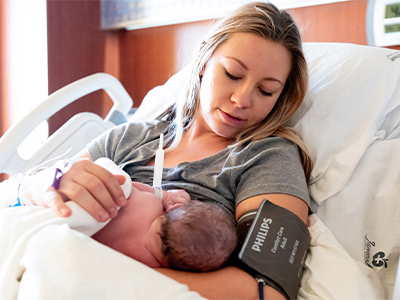Congratulations!
JRMC is honored and privileged to be your choice for obstetrical care! This is an exciting time and the JRMC Gynecology & Obstetrics team wants to ensure that you receive VERY good care.

At your first appointment, which is usually at 10 weeks gestation, expect the following:
- review health history
- physical exam
- ultrasound
- lab work
Our team will schedule office appointments for every four weeks and continue monthly until approximately 28 weeks. After 28 weeks, our team will schedule appointments for you every 2 weeks until the month prior to your due date. We will then start seeing you on a weekly basis. In some cases, you may need to be seen more frequently.
For the best opportunity to connect to your personal medical records when you want it, where you want it, when it’s convenient for you, JRMC recommends you sign up for MyChart.
helping you prepare
Jamestown Regional Medical Center is excited for you and your new addition. As you plan for the child’s birth, it’s also important to choose a provider who is well-versed in the needs of a newborn. Once you make your determination, JRMC will communicate with that provider to ensure a seamless transition for you and your new family.
Click on any of their images to learn more about them.
ACHES, PAINS AND HEADACHES
Acetaminophen (Tylenol) Expecting mothers may take 1-2 extra strength tablets every six hours as needed (No more than 6 tablets or 3,000 mg per day). Avoid aspirin containing products unless specifically instructed by physician. Expecting mothers should avoid Ibuprofen and Napoxen (ex. Motrin, Aleve, Excederin, Advil). Remember: “Take Tylenol. Avoid Advil, aspirin and Aleve.
CONSTIPATION
Colace, Citrucel, Fibercon and Miralax are all fine to consume while pregnant. Expecting mothers should also drink lots of water as well as eat fruits and veggies. Most of these medications won’t work if expecting moms don’t drink enough water.
HEMORRHOIDS
Expecting mothers experiencing hemorrhoids should increase fiber and water. Over-the-counter medications like Preparation H or Anusol may provide relief. If these are not working, please call and a provider may offer a prescription-strength medication.
HEARTBURN
Over-the-counter medications like Tums, Gaviscon, Mylanta, Maalox, Zantac 150, Prevacid or Pepcid AC may relieve heartburn. Avoid greasy, spicy and fried foods.
DIARRHEA
Immodium AD, clear liquids and a bland diet for 8-12 hours may help expecting moms experiencing diarrhea. A fever of 100.4 or greater, persistent diarrhea or vomiting require a call to the office: (701) 952-4878. DO NOT TAKE: Pepto Bismol because it contains aspirin.
NAUSEA
The best practice for nausea is to eat small, frequent meals.
Diet and lifestyle changes may help. In addition:
- take a gummy multivitamin instead of a tablet
- try eating dry toast or crackers in the morning before you get out of bed to avoid moving around on an empty stomach
- drink fluids often
- avoid smells that bother you
- eat small, frequent meals instead of three large meals
- try bland foods. For example, the “BRATT” diet (bananas, rice, applesauce, toast, and tea) is low in fat and easy to digest
- try ginger ale made with real ginger, ginger tea made from freshly grated ginger, ginger capsules and ginger candies
Nausea medications-Safe nausea medications include Emetrol, Unisom (Doxylamine), and Vitamin B6. You can take Unisom 25mg and Vitamin B6 25mg together in the morning and before bed. Unisom is a sleep aid so it may cause drowsiness. If you become too drowsy during the daytime you can take the vitamin B6 in the morning by itself. These medications should be taken prior to being nauseated for the best results. If these recommendations are not working call (701) 952-4878 as you may need to be seen nor have a prescription.
COLD/ALLERGIES/COUGH
Benadryl, Claritin D, Zyrtec, Mucinex and Robitussin DM are all safe to take during pregnancy. DO NOT TAKE phenylephrine-containing products like Sudafed PE.
YEAST INFECTIONS
Monistat 7 is the recommended treatment for expecting mothers with yeast infections.
WHAT IS INFANT SAFE SLEEP?
Sudden infant death syndrome (SIDS) is the leading cause of death among infants between 1 month and 1 year of age. This is what you can do to help your baby sleep safely and to reduce your baby’s risk of SIDS.
CREATING A SAFE SLEEP ENVIRONMENT
- Always place an infant on his or her back to sleep, for naps and at night. This helps reduce the risk of SIDS.
- Use a firm sleep surface, covered by a fitted sheet, a crib, bassinet, portable crib or play yard that conforms to the safety standards of the Consumer Product Safety Commission (CPSC) is recommended.
- Your infant should not sleep in an adult bed, on a couch or on a chair alone, with you or with anyone else.
- Keep your infant’s sleep area in the same room where you sleep, for the infant’s first year. Room sharing, not bed sharing. Always place the infant in a safety-approved crib, bassinet or portable crib for sleep.
- Sitting devices, like bouncy seats, swings, infant carriers or strollers, should not be used for routine sleep.
- Keep soft objects such as pillows and blankets, toys and bumpers out of your infant’s sleep area.
- Wedges and positioners should not be used.
- Do not smoke during pregnancy or allow smoking around your infant.
- Do not let your infant get too hot during sleep.
- Breastfeed your infant.
- Give your infant a dry pacifier that is not attached to a string for naps and at night to reduce the risk of SIDS after breastfeeding is established.
- Supervised Skin to Skin is recommended to all mothers and infants immediately following birth regardless of feeding or delivery, (as soon as the mother is medically stable, awake and able to respond to her newborn) and to continue for at least one hour. Once mother starts to become sleepy, return the infant to the bassinet.
- Follow healthcare provider guidance on your infant’s vaccines and regular health checkups.
For additional information and education on safe sleep please visit: https://cribsforkids.org/
JRMC follows the American Academy of Pediatrics (AAP) and their recommendations for current child restraints. The North Dakota Department of Health recommends that caregivers follow the most recent updates when transporting children in vehicles. Click HERE for the most up to date safety measures.
RECOMMENDATIONS
Infants and toddlers should ride in a rear-facing car seat for as long as possible, until they reach the highest size limits allowed by the manufacturer.
Children who have outgrown the rear-facing size limits for their car seat should use a forward-facing car seat with a harness for as long as possible, up to the highest size limits allowed by the manufacturer.
When children are old enough and large enough to use the vehicle seat belt alone, they should always use lap and shoulder seat belts for optimal protection. The lap belts must lie snug across the upper thighs and the shoulder belt should lie snug across the center of the chest.
All children younger than 13 years of age should be restrained in the rear seat of a vehicle for optimal protection.
In addition to choosing the right child restraint, parents and caregivers should carefully read both vehicle owner’s manuals and car seat instruction booklets to ensure correct use and reduce misuse.
For additional information and education on child passenger safety, visit www.ndhealth.gov.
DURING OFFICE HOURS...
For moms-to-be experiencing pregnancy related illnesses like colds, sore throats, ear aches, etc., our registered nurses are available at JRMC Clinic by phone from 8 am to 4:30 pm at (701) 952-4878. There may be times when we might recommend that you see your primary care physician if we feel they may be better equipped to manage your symptoms.
AFTER CLINIC HOURS...
Family BirthPlace
(701) 952-4807
for pregnancy-related emergencies such as vaginal bleeding or leaking of amniotic fluids.
Emergency Department
(701) 952-4845
for non-pregnancy related emergencies such as chest pain or shortness of breath.



